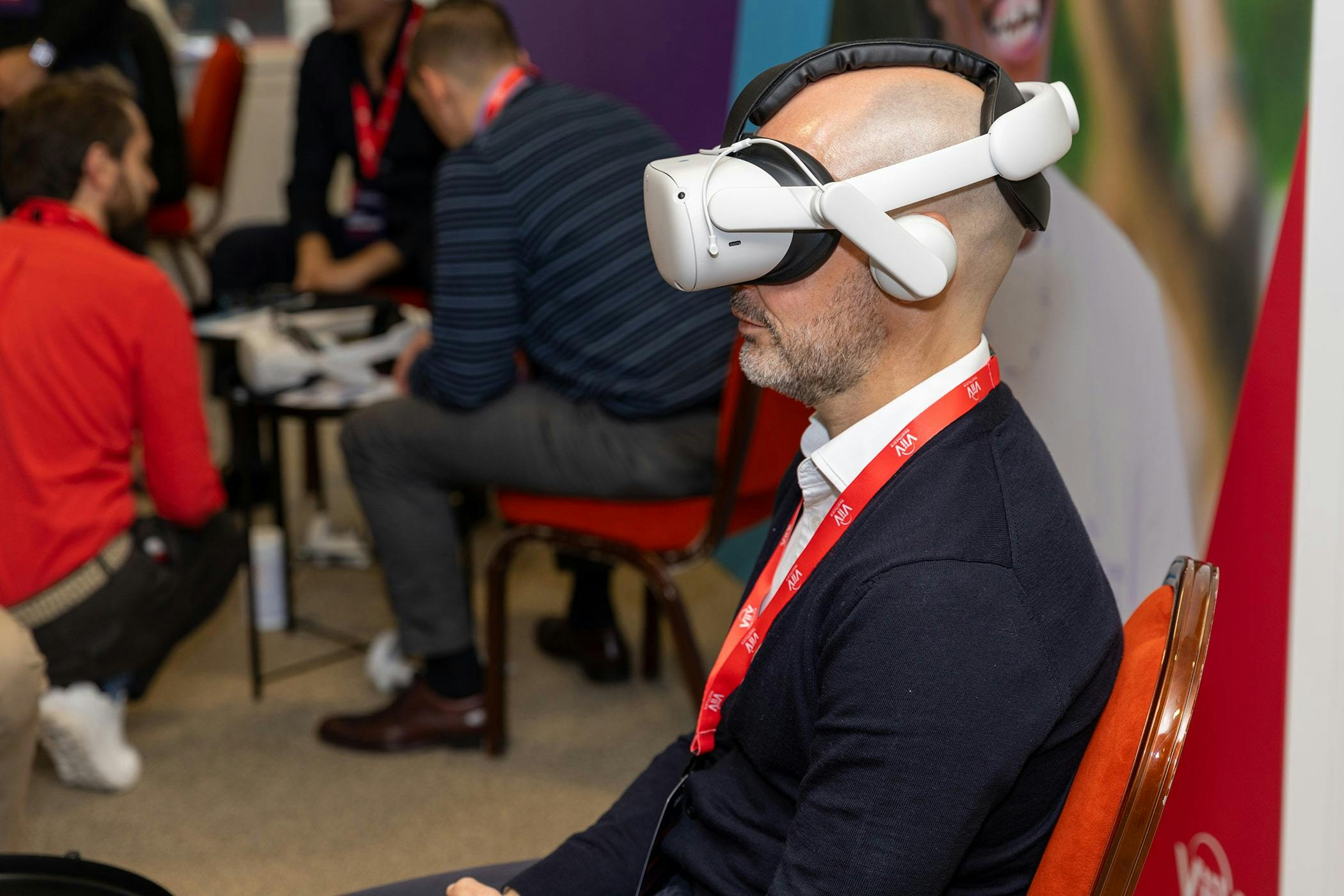WITH MODERN ADVANCEMENTS IN HIV MEDICINES AND CARE, PEOPLE LIVING WITH HIV CAN LIVE AS LONG AS PEOPLE WITHOUT HIV. BUT UNFORTUNATELY, HIV STIGMA IS STILL PREVALENT.
It’s a high-anxiety moment that most of us have experienced at some point. “I have your lab results here,” the health care provider (HCP) says.
In this case, the medical news is good: “Your results are excellent,” the HCP continues. “You’re doing great on your current medicines.”
But the HCP doesn’t stop there. Instead, she addresses another concern specific to a particular patient cohort. “I want to know,” she says, “how does your HIV diagnosis impact your daily life? And what can I do to help?”

A scene from "Chapters of Stigma" captures the stresses that even seemingly routine interactions in the health care system can cause.
Creating greater awareness of stigmatising language and behaviour
That scene is from an immersive virtual reality (VR) experience called “Chapters of Stigma,” which acknowledges the stresses and micro-traumas that many people living with HIV still endure despite the remarkable advances in drugs and other therapeutics over the past 40 years.
“People can live with HIV for decades now as long as they’re adherent to their medicines,” said Dr. Maggie Czarnogorski, head of digital innovation and implementation science at ViiV Healthcare. “But unfortunately, a lot of people still feel stigmatised. So we still have a lot of work to do in the HIV space. The medical advancements only work if we treat everyone’s needs.”
Exacerbating the challenge, many care providers are unaware of potentially stigmatising issues or their own role in causing stress or discomfort.
“I think everybody is trying to do the right thing,” Czarnogorski said. “It’s more a matter of creating greater awareness of these micro-moments that can lead patients to self-stigmatise.” A triggering moment can be something as basic as noticing that the building you enter is labelled an HIV clinic.

Dr. Maggie Czarnogorski, Head of Digital Innovation and Implementation Science at ViiV Healthcare,
A shift in perspective
For Dr. Czarnogorski, the aha moment that led to “Chapters of Stigma” came during an interaction with one of her own patients who was living with HIV. “He said, ‘I just wish everybody could walk in my shoes for one day,’” Czarnogorski recalled. “That’s when I started to think that maybe we could use today’s digital technology to actually make that happen.”
The immersive VR experience is separated into five chapters: Fear of Disclosure, Shame, Insecurity, Humiliation, and Embarrassment. Although presented from a young Hispanic male’s point of view, “Chapters of Stigma” depicts situations that are nearly universal among people living with HIV.
Explore the teaser to "Chapters of Stigma" from the perspective of a person living with HIV
“These moments came up over and over again in our interactions,” Czarnogorski said. “When you put on those VR goggles, you basically become that person and start walking through their day. You experience those micro-moments when you’re interacting with others and you feel the weight of thinking you need to hide your own truth because people might look at you differently.”
The scenes are portrayed with a stark simplicity to enhance emotional resonance. Other amplifiers include colour choices that studies have shown are associated with specific negative emotions.

“Chapters of Stigma” offers the perspective of a person living with HIV.
An overwhelming response
“Chapters of Stigma” debuted at the 12th IAS Conference on HIV Science in Brisbane, Australia. “The reaction we got was tremendous,” Czarnogorski said. “HCPs embraced it as a conversation-starter. Whenever someone took off the headset, they all basically said, ‘We need to do better.’”
One physician was moved to tears. Another described “Chapters of Stigma” as “a life-changing experience [that] will change my practices and how I interact with patients.”
The next “Chapters of Stigma” will capture the point of view of a Black woman, depicting another set of micro-interactions. “You’ll be able to walk through things like this woman’s dating life, family planning, and interactions with her family,” Czarnogorski said.
“Chapters of Stigma” productions under consideration would highlight the perspectives of others who are living with HIV, including transgender persons as well as adolescents. “There are many different points of view that we can showcase through this technology,” Czarnogorski said.
ViiV Healthcare plans to expand the audience for “Chapters of Stigma” beyond HCPs. “We hope to reach the next layer in that ecosystem, such as the families of people who are living with HIV,” Czarnogorski said. “It’s important that we go broader than just talking among ourselves in the HIV community.”
Seeing more than HIV
While overcoming the stigma of HIV requires a collective effort among the entire health care ecosystem, we all have the ability to make a profound impact. Here are some potential ways to approach interactions with people who are living with HIV:
- Choose your words carefully and avoid stigmatizing language.
- Use people-first language.
- Challenge myths and stereotypes.
- Pass on facts.
- Convey a positive attitude and offer support and encouragement.
“HIV medicines are getting better and better all the time,” Czarnogorski said. “But HIV stigma continues to persist. We need to keep developing technologies to improve their experience. We need to keep inspiring change.”
At ViiV Healthcare, we have a long-standing history and commitment to fighting HIV stigma and discrimination that the communities most affected by HIV face. That commitment goes back to our industry-leading Positive Action programmes, initially created by GSK, which have been tackling HIV stigma for almost 30 years.
While science and research has provided us with the means to effectively treat and prevent HIV, we won’t stop working with the communities most vulnerable to HIV with efforts spanning innovations in HIV care services, initiatives aimed at preventing HIV, building capacity in grassroots communities and addressing HIV stigma and discrimination.
NP-GBL-HVX-COCO-240006 September 2024
If you get any side effects, talk to your doctor, pharmacist, or nurse. This includes any possible side effects not listed in the package leaflet. You can also report side effects directly via the GSK Reporting Tool link https://gsk.public.reportum.com/. By reporting side effects, you can help provide more information on the safety of this medicine.
If you are from outside the UK, you can report adverse events to GSK/ ViiV by selecting your region and market, here.


